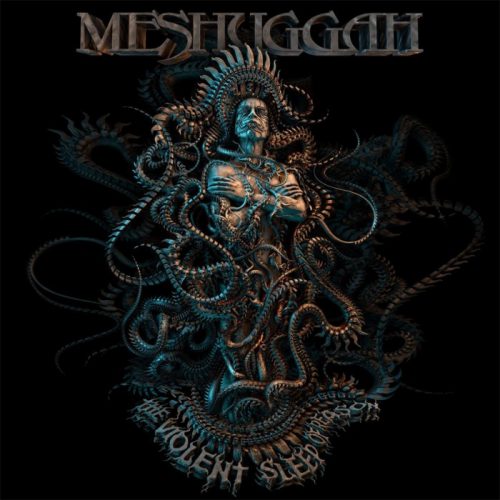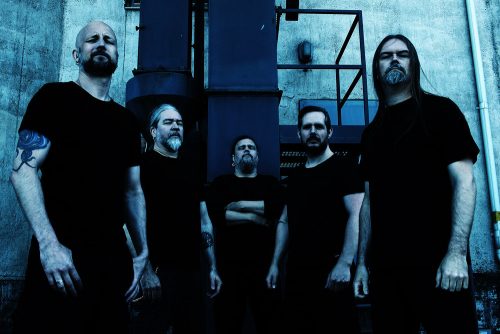 What does a band do when they’ve spent decades revolutionizing the very fabric of metal? A handful of the early century’s most innovative musicians get their say this fall – and in quick succession, as if ready to pass the torch on to the next generation of darkness. But one of those bands in particular has pitched a radical transformation in how and with what metal is played. Meshuggah, the dark and jagged jewel of Umeå, the darling of the brutal musicologist, the tectonic titan of absolute heft; they who brought us polymetric contortions, Debusseyan solos, and eight string guitars have made their answer clear. You do whatever you want.
What does a band do when they’ve spent decades revolutionizing the very fabric of metal? A handful of the early century’s most innovative musicians get their say this fall – and in quick succession, as if ready to pass the torch on to the next generation of darkness. But one of those bands in particular has pitched a radical transformation in how and with what metal is played. Meshuggah, the dark and jagged jewel of Umeå, the darling of the brutal musicologist, the tectonic titan of absolute heft; they who brought us polymetric contortions, Debusseyan solos, and eight string guitars have made their answer clear. You do whatever you want.
And as always, Meshuggah want nothing more than to sound like Meshuggah, but as any fan knows, that’s a broad target to hit. The Violent Sleep of Reason is different, though. The group aren’t shooting for heady conceptual pieces like I or Catch Thirtythree, nor are they returning to a thrashier sound a la Destroy Erase Improve, a step which Koloss feinted toward at times. Songs like “Stifled” and “Monstrocity” groove like ever before, but there’s a sense of almost playful energy to their freewheeling chugs. For the first time in a decade, Meshuggah doesn’t sound forced.
Sure, ObZen and Koloss were good albums, each with a few mind-blowing cuts, but their calculated songwriting and rushed recording didn’t leave much room for interpretation. These songs are a new breed; trim, aggressive and subtly varied in tempo and timbre. The muddy subwoofer-shattering explosion of “Into Decay” has an almost doom-sludge feel, and Kidman rides over its interleaved riffing like a bilious miasma. It’s stunning how different it feels just for the band to end an album on that aggressive note. Kidman’s voice is higher in the mix than usual, but he’s also more diverse – if that word can apply to a man with a vocal range of about half a step – than expected, and menacing rather than robotic.
Yet the show is stolen immediately not by Kidman, but by Haake. Opening the album, “Clockworks” features a beat that feels almost like a foxtrot with more legs. The Slepnir-like prance fuels a huge track behind one of the album’s best guitar solos, a vitreous splash of tonal incongruence. It’s perhaps the album’s most innovative piece, but telegraphs a slight misstep. Though often enveloping, these songs can be just a tad long, and “By the Ton” and “The Violent sleep of Reason” could each do with about 30 seconds less material. But if anything, The Violent Sleep of Reason’s biggest failure is the same as that of Koloss; it doesn’t bring new colors to the palette. Yet after nearly three decades, a solidified Meshuggah sound is far from unwelcome.

Even if The Violent Sleep of Reason was a wholesale musical retread of Meshuggah’s past exploits, it would still be hugely important because of how it has been produced. Bemoaned though it may be, the band’s influence has proven to be a game-changing force; when Meshuggah says jump, metalheads across the world go and buy a gym membership. The zeitgeist of technical metal moves in concert with the band’s last release. So it was with Nothing’s groovy polymetric phrases and Catch Thirtythree’s eight-string guitars, so it shall be with The Violent Sleep of Reason’s live recording. End-to-end, Reason is more athletic and agile than anything since Chaosphere, the mechanical precision of “Bleed” or “Pravus” abandoned in favor of tight but fallible tempos that suit the band’s writing far better than the former style. Metronomic adherence might help you count bars and marvel at the moving parts, but the clockwork was still driven by springs; now the band seem more like an engine than a timepiece, and they’re free to feather the pedal and move under inertia.
For a group that operates as a five-man rhythm section, it’s easy to see the merits in either approach. On Nothing, the droning tempo made their trance-inducing groove just that much more enveloping, and the absolute speed of ObZen set a new bar for drumming performance. But what more could Meshuggah have to prove? After playing “Bleed” every night for years, Haake has achieved the status of drumming deity, and the band have complained about the difficulty of writing and recording the last few albums spread across Sweden. The band’s discography is a monument to logistical constraint, and sans detuned guitars, click tracks, and programmed drumming, it must have been nice to record and write – for at least a while – as a band. The Violent Sleep of Reason is the work of such a messy and human apparatus, and all the more vital for it.
Rating: 3.5/5.0
DR: | Format Reviewed:
Label: Nuclear Blast Records
Websites: meshuggah.net | facebook.com/meshuggah
Releases Worldwide: October 7th, 2016

















